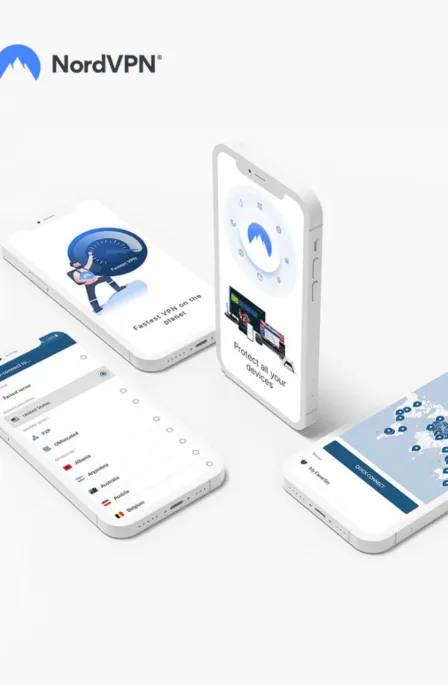ISPs monitor your data due to bandwidth throttling, data rentention laws, selling data to advertiser, and more. However, you can block ISP monitoring using precautionary steps, the best all-in-one solution is to use a VPN. Here’s how to use it:
- Visit the website of the secure VPN service like NordVPN and subcribe to budget-friendly plan
- Download and install the VPN application
- Open the VPN client and enter your login credentials
- Connect to a recommend server, and the tool will route your data through an encrypted tunnel
- Now all your data is protected from ISP tracking
ISP (Internet service provider) keeps hold of everything on your bandwidth, no matter what they say in their privacy policy. They monitor, watch, and filter your traffic for several reasons. After the Net-Neutrality Bill passed a few years ago, they cannot maintain your browsing history data and are with advertisers to create your “buyer personas” profile for further products.
Your ISP handles everything between you and your internet and monitors your browsing history. In short, they know the website you visit, when you visit it, and the time you spend there.
Let’s see what your ISP can see if your traffic is unencrypted. Also, find a solution for your concerned exposed data.
Why is your ISP tracking you?
ISP tracking is not sudden; your service provider is not monitoring your traffic without any purpose. With the DNS query resolving process, your ISP knows every website you visit as soon as you enter the URL into the search box.
There could be two main reasons for ISP monitoring your browsing history.
- The laws of the country or region you are living in.
- Net-Neutrality rules (ISPs want to promote their own services and display ads according to your browsing preference).
Country laws regarding citizen privacy
Although every country has some regulations regarding citizen privacy, including online data processing clauses and details, these laws could be present in different forms with different names.
Some countries have lenient laws that don’t force ISPs to keep user data (instead of some suspicious individuals). However, many countries maintain laws and rules to keep user data for a certain period. This period may vary among the regions. A popular kind of such regulation is “data retention law,” which is the rule in many countries worldwide.
Net Neutrality rules
Your country probably has Net Neutrality rules that promote equal rights to all content without favoring or prioritizing anyone. However, ISPs still do such activities without acknowledging users.
Sadly, after the repeal of Net Neutrality rules, your ISP can openly sell user data and prioritize content if you live in the US.
ISPs can profit from user data and traffic in many ways. But the prominent ways are;
- Through selling your data and browsing preferences to third-party organizations in exchange for money. Almost all of the individuals have experienced popup ads while browsing. But the thing to notice is that these ads match our previous searches. For instance, if you are looking for a T-shirt, your screen will display a popup ad with the tagline “cool T-shirts at a low price” or any other attractive phrase the next day.
- They promote their services and more traffic. For instance, if your ISP sees that you stream videos on YouTube, they may show you their website with higher results.
How to block and stop ISP tracking
There are effective ways to eliminate ISP monitoring. However, remember that not every method provides complete protection.
The ways we will discuss with you could work well with another solution or be enough alone.
Let’s find out.
- Browsing HTTPS websites only ensures that the data inside that particular website is encrypted before transferring. You can use the HTTPS Everywhere plugin to ensure the websites you visit are encrypted (with HTTPS in the URL).
- Using a VPN is a solution to block ISP tracking. You don’t need to implement any other solution. The VPN tool efficiently encrypts every app’s internet traffic, including every website (HTTP also) and other traffic going towards the internet. Ensure the VPN you select supports torrenting and has a kill switch. Our top choice is NordVPN, which has advanced privacy features, torrenting support (with a kill switch), and identity theft protection.
- Tor (Onion Routing) can also anonymize your browsing history. However, you will face obvious speed degradation because of the vast network of virtual tunnels and numerous nodes.
- Adjust your DNS settings to a third-party DNS. If you are using a VPN, it will automatically set the anonymous VPN DNS server. Changing settings is necessary because most devices use ISP DNS to resolve the DNS query. Popular choices for third-party DNS providers are OpenDNS and GoogleDNS.
- Use an email provider with TLS encryption (this will only secure your email content). For instance, STARTTLS is a popular, secure email service from EFF. But you should know that the email provider can see your emails. Also, some services like Google Mail symbolize a threat. The threat is denoted with a small red lock if any recipient or sender does not correctly use TLS. You can request another email or notify the recipient to resolve the issue.
What ISP can see when your traffic is unencrypted
1. Passwords and details of the website you visit
If you visit an unencrypted website, i.e., the HTTP version, your ISP will get the exact name of that site. For instance, you visit an online shopping website, create an account, log in to the existing account, and purchase anything. Now, your ISP will get the website name, the thing you purchased, the account password and other details, and the payment information (if you entered any).
2. Your personal emails
There are two conditions when your ISP can see your email content.
- When you are not using Transport Layer Security (TLS) encryption while accessing an email provider.
- If you are using the ISP email service.
Most likely, you fall into one of these conditions.
How to get rid of it
Use an email provider with TLS encryption. For instance, STARTTLS is a popular, secure email service from EFF. But you should know that the email provider can see your emails.
Also, services like Google Mail symbolize a threat with a small red lock if any recipient or sender does not correctly use TLS. You can request another email or notify the recipient to resolve the issue.
(VPN could get this resolved most efficiently)
3. Torrenting and streaming stuff (Reason for ISP throttling)
Many of you might know the perils if you get exposed while torrenting. Your sensitive details, such as location and IP, are visible to many people while you torrent, and your ISP has more stuff to look at.
Even if you are torrenting legal stuff, your ISP will likely throttle your internet speed for many reasons. Commonly, they throttle to remove load from their servers. Also, you can get notices from your ISP.
4. Bitcoin transactions
Despite the common perception of Bitcoin transactions being anonymous, your ISP can easily spot Bitcoin usage in certain conditions.
For instance, your ISP can get you if you are an ordinary Bitcoin client sending standard and uniquely formatted unencrypted messages to well-constructed TCP ports.
Your ISP can easily predict that you create a transaction by looking at the traffic you send out, but it is not received by someone else.
Can your ISP track you while using a VPN?
Have you encrypted all your traffic? If yes, you are secure from hackers, snoopers, and ISP looking at your exact data.
But, still, there is a chance of ISP tracking.
Although your ISP cannot know the exact data after encryption, they can still trace the unencrypted metadata to infer your browsing patterns and practices. ISP can make robust predictions by noticing traffic patterns’ size, frequency, and timings.
A study revealed that a YouTube video has a particular pattern when streamed on a device. Therefore, ISPs can access the exact video if they want.
Most people think it is okay if their exact data is protected and the ISP gets just your routine browsing patterns. But in some cases, your data can get exposed, too. A study on IoT devices states;
An ISP or other network observers can infer privacy sensitive in-home activities by analyzing Internet traffic from smart homes containing commercially-available IoT devices.
Therefore, VPN encryption (which is secure and makes it almost impossible for ISP to spot the device you are using) could be undermined if you have one IoT device or various devices sending out scattered traffic.
Share this article
About the Author
Rebecca James is an IT consultant with forward thinking approach toward developing IT infrastructures of SMEs. She writes to engage with individuals and raise awareness of digital security, privacy, and better IT infrastructure.
More from Rebecca JamesRelated Posts

10 Best Alternatives of Tunnelbear (Free and Paid in 2024)
KEY TAKEAWAYS If you have decided not to use TunnelBear VPN, then the following VPN providers will i...

4 Best Ways to Stop ISP Throttling Enjoy Fast Speed in 2024
KEY TAKEAWAYS If you’re experiencing ISP throttling, using a VPN is the best method to prevent...

How to Hide Your IP Address? 7 Best Ways
KEY TAKEAWAYS Masking your IP address is necessary to protect yourself from multiple cyber threats. ...

What is a VPN Kill Switch and How Does it Work?
Numerous internet users have now observed the possible risk of online data exposure to ISPs or cyber...

Does VPN Slow Down Internet Speed? [Resolved]
KEY TAKEAWAYS A VPN connection indeed reduces your speed because of encryption protocols. It routes ...

Why Should You Use a VPN? 12 Best Reasons
KEY TAKEAWAYS As almost everyone has nowadays access to the internet, more cyberattacks are taking p...




